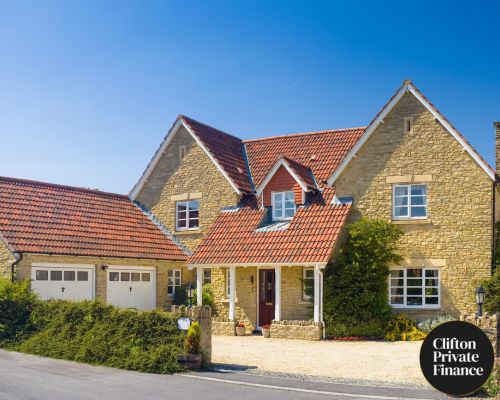Categories
How to Apply for a Mortgage When Retired

Getting a mortgage once you are older can be a more difficult prospect, but it’s not impossible.
With a range of mortgage products designed specifically to facilitate property purchase and equity release for older people, obtaining a mortgage once you are over 65 is achievable - provided you listen to the advice of experts.
Thankfully, Clifton Private Finance are here to help you with that expertise. Read on to discover how to apply for a mortgage when retired.
To speak to us about booking a free consultation with an adviser, please get in touch below.
Table of Contents
Mortgages for People 65+
Standard Mortgages for Retirees
Applying for a Mortgage When Retired - 8 Steps
1 - Home Equity
2 - Property Suitability
3 - Occupancy
4 - Homeowner’s Age
5 - Health and Lifestyle
6 - Independent Professional Advice
7 - Documentation
8 - Income and Creditworthiness
Equity Release and Inheritance
How to Apply
Mortgage Options for People 65+
Why would you want a mortgage after age 65 - do you really want to be buying a house? The fact is, that more and more people are looking to mortgage finance in their retirement, and not just for buying a property (though that’s certainly viable).
Equity release mortgages, also known as lifetime mortgages provide a way to capitalise on the money you have poured into your home, leveraging the property to obtain finance now that doesn’t have to be repaid until you no longer need the home; thus the term ‘lifetime’.
A lifetime mortgage gives you access to your money now, when you need it, rather than locking it up until it’s no longer relevant.
You retain the right to stay in your home until death, or moving into full-time residential care, so there’s no worry that you might find yourself without your home.
It’s a win-win for many retirees, looking to enjoy their retirement without the worry of surviving on a meagre pension.
Standard Mortgages for Retirees
While obtaining a standard mortgage once you have reached retirement age isn’t impossible, it does become a lot more difficult. Lenders are keen to mitigate the risk of the mortgage and will need assurances that you are capable of repaying it.
Consequently, standard mortgages for older people tend to have shorter terms than those provided to younger customers, with higher monthly repayments.
Applying for a Mortgage When Retired - 8 Steps
There are three main products that make up the specialist retirement mortgage landscape:
- Equity release, or lifetime, mortgages
- Home equity lines of credit, or HELOC
- Retirement interest-only mortgages, or RIO
And while they represent different ways to leverage your home equity to fund your retirement, they all follow some similar needs when it comes to making a successful application.
1 - Home Equity
In order to obtain an equity release product, you need equity in your home.
Equity is the amount of your home you own. If you have paid your original mortgage off in full and haven’t taken out any other sort of loan with your home as collateral, then your equity would be 100% and equal to the value of your home.
Should there be other finance leveraged on your home, then this would lower your equity.
As you are using your home as the collateral for the loan, you must have the relevant equity in the property.
Home equity mortgages and any related products are not available for non-homeowners.
2 - Property Suitability
The property itself must also be eligible for a home equity loan. This means it must be:
- A permanent UK residence - Properties in other countries, or those that are not permanent, such as mobile homes, caravans, and narrow boats, are not suitable for use as collateral for a lifetime mortgage.
- Of an applicable property type - Most standard residential properties are eligible, such as houses, bungalows, and flats. Retirement homes, local authority flats, and houses of non-standard construction are often rejected for home equity loans.
- Of sufficient value - Properties valued under £70,000 are unlikely to be accepted for a lifetime mortgage.
- In a liveable and saleable condition - Houses requiring substantial repair and maintenance may be ineligible.

3 - Occupancy
Home equity mortgages are only available for homeowners who are resident in the property, so you have to be living in it to get a lifetime mortgage.
If you get a joint lifetime mortgage with your spouse or partner, then the mortgage terms will continue as long as one of you remains resident.
If the property is no longer occupied by one or more of the lifetime mortgage holders for an extended period, then the home must be sold and the full balance of the lifetime mortgage repaid.
4 - Homeowner’s Age
The age of the mortgage applicant has a significant impact on the level of lifetime mortgage available, with older people able to obtain larger loans on their property.
5 - Health and Lifestyle
While your health (in any condition) will not result in you being rejected for a lifetime mortgage, it will have an impact on the size of the loan available.
6 - Independent Professional Advice
Under UK law, it is required that anyone taking out a lifetime mortgage has received thorough independent professional financial advice regarding the agreement.
Proof of this advice will be requested by the mortgage lender prior to finalising the contract.
Clifton Private Finance are here to help. Our team of specialist partners will discuss the options with you candidly, ensuring that you make a fully informed decision regarding any financial product. Your adviser works for you, not the mortgage lender, and will help you make the right choice for your circumstances.
7 - Documentation
You will need to make sure you have the required documentation to validate every part of your application. This includes:
- Full UK identity documentation
- Bank details
- Property title deeds
- Existing mortgage details, if relevant (any existing mortgage must be repaid prior to, or as part of, the lifetime mortgage)
8 - Income and Creditworthiness
Proof of income is not needed for most lifetime mortgages, as there is no obligation to repay any of the lifetime mortgage until the property is sold.
However, Retirement Interest-Only (RIO) mortgages do have this additional criteria, as monthly interest payments form part of the mortgage.
In this instance, you will need to show your full income details. This may include information on:
- Pensions, both private and state
- Investments and shares
- Savings
- Additional assets (such as second properties or vehicles)
As you will undertake affordability checks as part of your RIO mortgage application, detailing as much income as possible will be helpful to ensure a successful decision.
Additionally, you will be assessed on your creditworthiness, including a full credit scoring check.
Recent Equity Release Case Studies



Additional Responsibilities
In addition to the eligibility criteria, ongoing maintenance and upkeep of the property will also form part of your equity release contract. It is important that you take out the relevant insurance policies and keep the home in a good condition.
In some circumstances, this may mean that part of the money provided by the equity release should be set aside for future home repairs.
Equity Release and Inheritance
An equity release mortgage will impact the inheritance that you leave for your heirs.
The mortgage is a loan secured on the home with the understanding that when you no longer need the property personally, it is sold and the debt repaid in full.
As a lifetime mortgage accrues interest in the months and years between the loan being provided and its being repaid, there may be a significant difference in the final balance and the original capital received.
Many lifetime mortgage products include an optional ring fencing clause, which protects a portion of the home equity to ensure that some is left as an inheritance. This ring fencing will impact the size of the loan available, but ultimately means not all of the property is liable to repay the final debt.
Lifetime mortgages, HELOC, and RIO mortgages are all governed by the Financial Conduct Authority (FCA) in the UK, which includes an obligation by the lender to undertake responsible lending. Entering into a lifetime mortgage agreement can only be done as an informed decision with additional independent financial advice.
It is advisable that you discuss your equity release mortgage plans with any adult heirs prior to application.
How to Apply
At Clifton Private Finance, we work with equity release specialists available to help you get the most out of your home.
An adviser will discuss with you the full implications of the lifetime mortgage products we can obtain for you, and make sure that you are making a fully informed decision that is not detrimental to you. There are no pushy sales tactics and your adviser has no vested interests with any specific mortgage supplier.
For confidential and thorough equity release advice, call to book in with an advisor today.





















